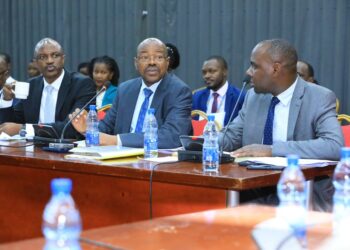The number of Ugandan men opting for vasectomy is rising, the ministry of Health has said.
Vasectomy is a permanent family planning method for men that stops sperms from being injected into semen. During the procedure, male vessels that carry sperms from the testicles are cut and tied so as to prevent sperm from entering into the urethra. This prevents the fertilization of a female through sexual intercourse.
According to doctors, the number of men opting for vasectomies has increased in urban areas compared to rural settings. Dr Placid Mihayo, the assistant commissioner of reproductive health at ministry of Health says the numbers are increasing in urban centres where the literacy levels are higher. He said the men who actually go for the procedure come when they are well-informed after extensive research, consultations and reading.
Data from the ministry shows an increase in the number of men who carry out vasectomy have been noted mostly in central and western Uganda. In the 2017/2018 financial year, a total of 1,235 vasectomies were carried out nationally compared to 1,313 men in 2018/2019.
Marie Stopes carries out family planning through three channels-outreach carried out in government facilities at no cost. The other two channels; centers and social franchise-where men pay. Through the social franchise channels, men need to part with Shs2,000. At centers, men pay Shs100,000.
In 2009, Joseph Sekasi a taxi driver and father of three at the time welcomed his second set of twins into the world. He describes the experience as a shock that opened his eyes.
“We had planned to stop on three children but my wife conceived again. We had talked about her getting the coil. When she told me she was pregnant I was not happy about it. At the hospital when I was told I was a ‘salongo’, I almost collapsed.”
According to Sekasi, the surprise of getting another set of twins was too much for him because he had always planned on having three children. To avoid further surprises, he took matters in his own hands.
“I did not want another surprise. Already I was struggling to maintain my family. When I asked a doctor, I was told about family planning for men. At first, I was scared but after the nurse explained to me, I accepted.”
Dr Milton Awudo, the director of technical services at Marie Stopes Uganda says the number of vasectomies carried out in centers that are run as private facilities are increasing, while those carried out during outreach programmies are reducing.
According to Dr Awudo, in 2017 and 2018 they experienced an increase of 5 per cent in the number of men who opted for the family planning method. This however says is happening at a time when the overall number of men carrying out vasectomies is reducing. In 2017 a total of 455 men were registered compared to 291 in 2018. This year, they have so far only carried out 94 vasectomies.
Dr Awudo attributes the increase and decrease to knowledge about the family planning method. He says people who pay for the service privately make an informed decision to undergo the procedure compared their counterparts who do not know what the procedure entails.
Dr Awudo, adds that most men in rural areas look at family planning as the responsibility of women. He says this coupled with myths and the stigma surrounding male family planning options leads to low numbers. Dr Mihayo says the increase has only been noted in certain parts of the country because men still have myths concerning vasectomy. He says most men equate vasectomy to castration which is completely false.
Men who have vasectomies are encouraged not to have sexual intercourse for at least three months after the procedure or to use other family planning methods like condoms because the family planning method is not instant.
Men with; abnormalities of the scrotum, severe high blood pressure, infections around the genital areas or who just had babies are not advised to carry out vasectomies.
URN
Do you have a story in your community or an opinion to share with us: Email us at editorial@watchdoguganda.com











